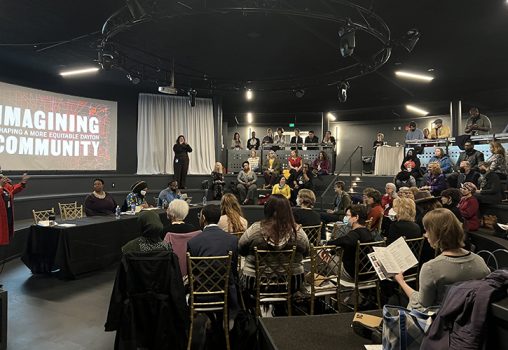
Several Wright State faculty members are helping to organize and participate in the “Imagining Community: Housing Justice and Flourishing Neighborhoods” symposium on Feb. 16-18. (Photo courtesy of the University of Dayton)
The issue of fair housing and what can be done to improve neighborhoods in Dayton are the focus of a three-day symposium in which Wright State University plays a key role.
The symposium “Imagining Community: Housing Justice and Flourishing Neighborhoods” will be Feb. 16–18 at The Hub Powered by PNC Bank at the Dayton Arcade, 35 W. Fourth St. The event runs from 8 a.m. to about 6 p.m. on Feb. 16 and 17 and to about noon on Feb. 18. It is free and open to the public.
The symposium features art exhibits, workshops, panels and presentations exploring the history, legacy and impact of injustice in Dayton and strategies to move toward a more equitable and inclusive community.
It is sponsored by Wright State University, the University of Dayton, Sinclair Community College, the Dayton Metro Library and other Dayton community partners.
For information and registration, visit udayton.edu/artssciences/endowedchair/roesch/imagining-symposium.php.
The symposium’s steering committee includes two Wright State faculty members, Marlese Durr, Ph.D., professor of sociology and coordinator of African and African American studies in the School of Social Sciences and International Studies, and Kelli Zaytoun, Ph.D., professor of English and director of interdisciplinary curricular development in the School of Humanities and Cultural Studies.
“Wright State is a metropolitan university,” Zaytoun said, “and has faculty experts whose research benefits our area directly. The symposium gives us a chance to hear about their work and for it to be a part of strategies for a more-just Dayton community.”
Durr said, “Wright State wants to be in the forefront because we have scholars working on this with community groups. We want to make sure our role is made known. We do have that commitment.”
“Imagining Community” is a follow-up to last year’s inaugural symposium, which focused on the practice of redlining. Redlining describes the color-coded maps that emerged from 1930s federal homeownership programs that designated so-called risk areas for government-backed mortgages. Areas with significant Black populations were often identified as investment risks, which isolated Black communities from resources available in other areas.
“It started with redlining,” Durr said of last year’s symposium. This year, she said, “We’re trying to see how Dayton can do better. How can we improve these communities.”
The importance of this year’s symposium, Zaytoun said, “is to help the city address these issues associated with sustainable housing, African American health and medical issues and justice.”
She said Wright State and the two other institutions of higher learning are “coming together with community members, agencies, nonprofits — bringing all of these resources together to try to solve these issues of housing and justice.”
Representatives of Wright State’s Boonshoft School of Medicine, including Shannon Nicks, Ph.D., associate professor of pediatrics, will address African American infant mortality.
Sarah Twill, Ph.D., professor of social work at Wright State, will discuss using data to improve the homeless system. Durr will be a member of the housing panel.
Also scheduled to speak is Nan-C Moss Van, a Wright State graduate and director of leadership annual giving at the University of Dayton, who will discuss African American women’s pregnancy and postpartum issues.
A special exhibit will be at the Dayton Metro Library, “The Evicted,” based on Matt Desmond’s Pulitizer-Prize-winning book “Evicted.”

 Wright State to expand nursing facilities to meet workforce needs and prepare more graduates for in-demand careers
Wright State to expand nursing facilities to meet workforce needs and prepare more graduates for in-demand careers  Wright State student-athletes make a lasting impact on local family with more to come
Wright State student-athletes make a lasting impact on local family with more to come  Wright State names Rajneesh Suri dean of Raj Soin College of Business
Wright State names Rajneesh Suri dean of Raj Soin College of Business  ‘Only in New York,’ born at Wright State
‘Only in New York,’ born at Wright State  Wright State president, Horizon League leaders welcome new commissioner
Wright State president, Horizon League leaders welcome new commissioner 